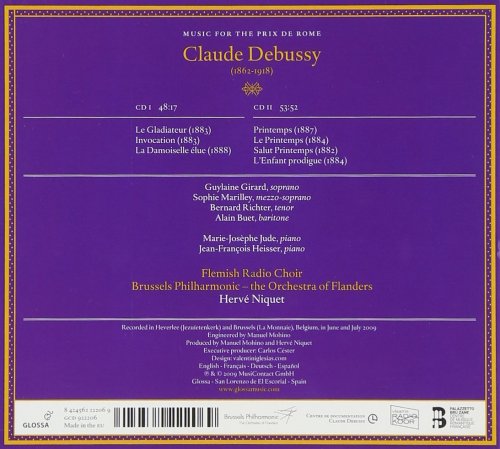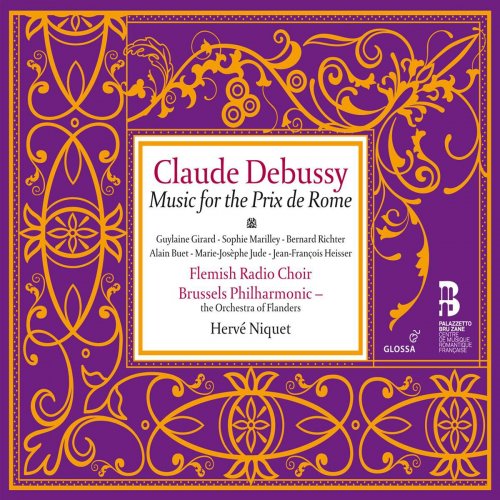
Hervé Niquet - Debussy: Music for the Prix de Rome (2010)
BAND/ARTIST: Hervé Niquet
- Title: Debussy: Music for the Prix de Rome
- Year Of Release: 2010
- Label: Glossa
- Genre: Classical
- Quality: FLAC (tracks+booklet)
- Total Time: 101:36 min
- Total Size: 467 MB
- WebSite: Album Preview

Tracklist:
1. Prelude et recit: Mort aux Romains. (Narbal)
2. Air: O peuple habile. (Narbal)
3. Invocation: Baal, source de feu. et scene (Narbal, Fulvie)
4. Duo: Trop tard, j'ai compris ton emoi. (Fulvie, Narbal)
5. Duo: L'impatience populaire. (Fulvie, Narbal)
6. Scene et trio: Ma fille ! Dans les bras de cet homme !. (Fulvie, Narbal, Metellus)
7. Scene: O Fulvie !. Adieu. (Fulvie, Narbal, Metellus)
8. Invocation
9. La damoiselle elue
10. I. Tres modere
11. II. Moderato
12. Le printemps (arr. C. Lehn)
13. Salut Printemps
14. Prelude
15. Recit et air: L'annee en vain chasse l'annee !. (Lia)
16. Cortege et air de danses
17. Recit et air: Ces airs joyeux, ces chants de fete. (Azael)
18. Scene: Je m'enfuis. (Lia, Azael)
19. Duo: Heures fortunees !.et scene (Lia, Azael)
20. Air: Faites silence !. et scene (Lia, Azael, Simeon)
21. Gloire a toi Seigneur. (Lia, Azael, Simeon)
Winning the Prix de Rome, a subsidized residency at the Villa Medici giving the artist four or five years to compose, was a rite of passage for French composers for much of the 19th century. The process of competing for the prize, and then producing a required number of works while in Rome, created a substantial body of music, particularly since composers frequently had to make a number of attempts before winning. This two:CD set includes most of the surviving music Debussy wrote for the competition and as part of his residency. Three of the works, L'Enfant prodigue, his winning 1884 cantata, and Printemps and La damoiselle élue, which he wrote in Rome in 1887 and 1888, are fairly familiar, and recorded with some frequency, but the remaining pieces are obscure and some are recorded here for the first time. The earliest work is Salut Printemps, the qualifying, first:round piece for the 1882 prize, an attractive and warmly lyrical piece for soprano, women's chorus, and orchestra. Le gladiateur, a dramatic cantata that was the runner:up for the 1883 prize, is an entirely competent piece, the work of a very talented student, but not something likely to inspire repeated hearings. The very next year, with the qualifying piece (Le Printemps, for chorus and piano) and the cantata L'Enfant prodigue, which won Debussy the Prix, he emerged as a composer with something to say, and it's possible to hear his unique voice developing. He was doing something harmonically new and out of the ordinary, so it's no wonder the more conservative judges were troubled by his win. Light years beyond his work of the previous year in its level of inspiration, technical assurance, and dramatic effect, it's easy to see why the cantata remains in the repertoire, and its opening soprano solo is a staple of vocal recitals. He had fully hit his stride, and La damoiselle élue and Printemps demonstrate his growing individuality. It's valuable to have this collection tracing Debussy's early development, but the set has some drawbacks. All of the works except for L'Enfant prodigue are performed with piano, either two: or four:hands. Debussy claimed that the full score of Printemps was lost in a fire, and that only the piano reduction survived. In 1912, he had Henri Büsser orchestrate the work under his supervision, and it's this version that is most performed today. The piano version is interesting as a novelty, but not much more since the work is primarily atmospheric, and much of its appeal lies in its orchestral colors. The remaining works were written for orchestra, so it must have been a matter of economics to have them accompanied by piano on this recording. Conductor Hervé Niquet is a specialist in the French Baroque, so he seems an unlikely choice as the director, but he manages very well. The Brussels Philharmonic, the Flemish Radio Choir, the pianists, and the vocal soloists all do a fine job, but these are not knock:'em:dead performances. The album will be a must:have for Debussy devotees, but general audiences with an interest in Debussy would do better to seek out top:flight performances of L'Enfant prodigue, La damoiselle élue, and Printemps, of which there are many.
As a ISRA.CLOUD's PREMIUM member you will have the following benefits:
- Unlimited high speed downloads
- Download directly without waiting time
- Unlimited parallel downloads
- Support for download accelerators
- No advertising
- Resume broken downloads


